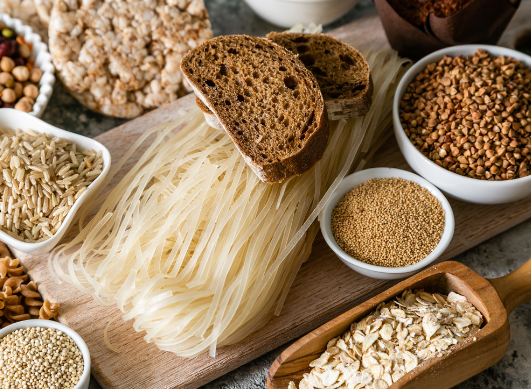- Home
- Share
- Forum
- General forums
- Living with cardiovascular diseases
- 9 tips for a heart-healthy diet
9 tips for a heart-healthy diet
- 17 views
- 0 support
- 1 comment
All comments

robjmckinney
AmbassadorGood advisor
![]()
robjmckinney
Ambassador
Last activity on 27/03/2025 at 18:59
Joined in 2015
617 comments posted | 12 in the Living with cardiovascular diseases group
52 of their responses were helpful to members
Rewards
-
Good Advisor
-
Contributor
-
Messenger
-
Committed
-
Explorer
-
Evaluator
This seems to me a genes issue to me, my wife who is obese, an enlarged heart, COPD but her cholesterol has been perfect throughout her life, same with blood sugar levels. But for me I have had high cholesterol levels, diabetes, overweight but no heart issues as yet. My wife's heart issues I feel are more related to smoking and her genes her Mother had heart problems. Compounded by of course GPs failing to deal with high blood pressure earlier in her life which could have reduced the heart issues today.
So my conclusion from my reading into the subject is not diet but GPs yet again failing to deal with high blood pressure and of course in my wife's case her smoking. Cholesterol is down to your parents efforts/genes and monitoring levels a useful tool. Diet in my case has helped my levels but then Statins and other drugs the norm in middle age these days.
See the signature
robjmckinney
Give your opinion
Survey
Articles to discover...

14/03/2025 | Nutrition
Carbohydrates: Friend or foe? Everything you need to know to make the right choices!
Subscribe
You wish to be notified of new comments
Your subscription has been taken into account







Margarita_k
Community managerGood advisor
Margarita_k
Community manager
Last activity on 07/10/2020 at 11:39
Joined in 2016
1,195 comments posted | 18 in the Living with cardiovascular diseases group
1 of their responses was helpful to members
Rewards
Good Advisor
Contributor
Messenger
Committed
Explorer
Evaluator
Healthy diet is essential for well-being, especially if you have cardiovascular problems.
The food you eat should be carefully chosen, taking into account various health issues that are related to cardiovascular system and can also trigger complications or other conditions. Thus for example, you should be aware of your cholesterol level and try to keep it low. The same with blood pressure and glucose levels.
Healthy cooking habits should also be adopted. Here is an article on Healthy cooking tips that we strongly recommend.
Most of you are undoubtedly already aware of the guidelines to a healthier diet, but we've decided that reminding the basic rules can be of use.
1. Serve more vegetables, fruits, whole grains, and legumes.
Just about everyone could stand to eat more plant-based foods. They're rich in fiber and other nutrients, and they can taste great in a salad, as a side dish, or as an entree. Watch that you don't use too much fat or cheese when you prepare them.
2. Choose fat calories wisely by:
> Limit saturated fat (found in animal products).
> Avoid artificial trans fats as much as possible. Check ingredient lists for "partially hydrogenated" oils.
> When using added fats for cooking or baking, choose oils that are high in monounsaturated fat (for example, olive and peanut oil) or polyunsaturated fat (such as soybean, corn, and sunflower oils).
3. Serve a variety of protein-rich foods.
Balance meals with lean meat, fish, and vegetable sources of protein.
4. Limit cholesterol.
Cholesterol in foods, found in red meat and high-fat dairy products, can raise blood cholesterol levels, especially in high-risk people.
Everybody knows that cholesterol is bad for heart health, and many people try to limit their daily cholesterol intake. However, sometimes we think that we're trying our best to eat healthy but the cholesterol level just does not come down. Read this article about 10 Common Cholesterol Mistakes and learn how to avoid them.
5. Serve the right kind of carbs.
Include foods like brown rice, oatmeal, quinoa, and sweet potatoes to add fiber and help control blood sugar levels. Avoid sugary foods.
6. Eat regularly.
This helps someone with heart disease control blood sugar, burn fat more efficiently, and regulate cholesterol levels.
7. Cut back on salt.
Too much salt is bad for blood pressure. Instead, use herbs, spices, or condiments to flavor foods. This article 3 tips for a lower-salt diet can be of use to you if you wish to cut back on salt consumption.
8. Encourage hydration.
Staying hydrated makes you feel energetic and eat less. Encourage your loved one to drink 32 to 64 ounces (about 1 to 2 liters) of water daily, unless their doctor has told them to limit fluids.
These two articles can help you learn more about benefits of pure water as well as about different ways you can make your water taste better in a healthy way:
> 7 Science-Based Health Benefits of Drinking Enough Water
> 6 tips to make water taste better
9. Keep serving sizes in check.
It can help to use smaller plates and glasses, and to check food labels to see how much is in a serving, since it's easy to eat more than you think. Some guidelines:
> 1 ounce of cheese is the size of a pair of dice.
> A serving of meat or tofu is the size of a deck of cards.
> 2 servings of rice or pasta are the size of a tennis ball.
Source: webmd.com
___________________
Have you got other tips or advice based on your own eating habits? Don't hesitate to share them with the community.